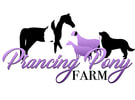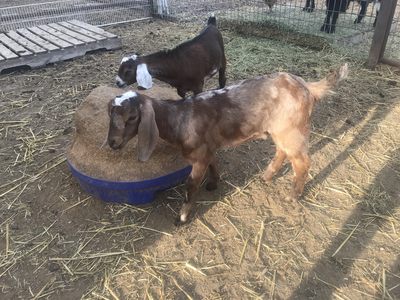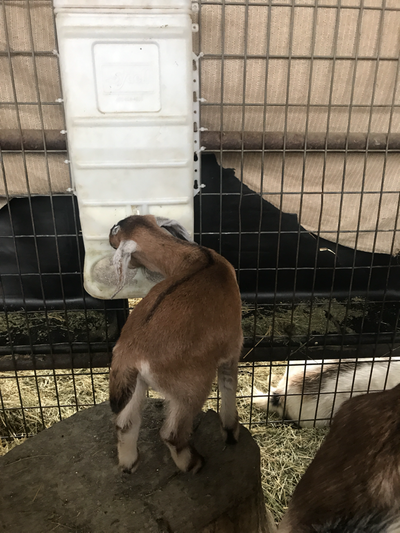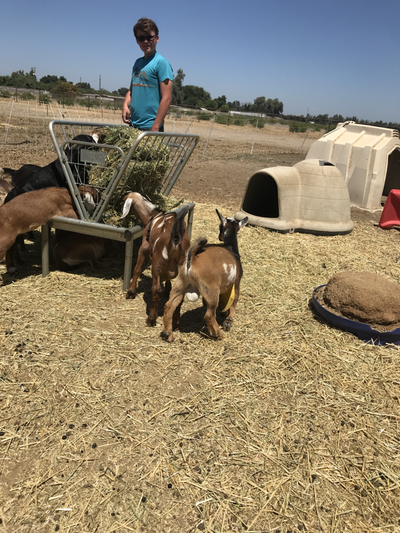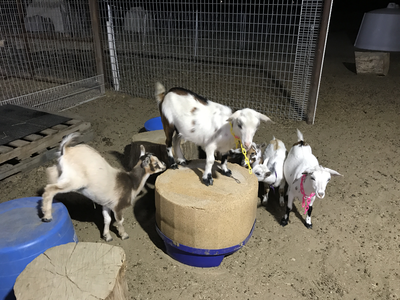Feeding Baby Goats
Here at Prancing Pony Farm we dam raise our goat kids whenever possible, as we feel strongly that doing so makes for the healthiest and happiest kids and does. Most does do a much better job of raising their kids than we could and each kid gets milk tailored exactly for their needs in just the right amounts. There's less chance of over or underfeeding the kids and fresh raw goat milk is the best food for baby goats. Both under and over feeding can be deadly to baby goats so we prefer not to risk it if we can avoid it. Kids also learn valuable lessons on how to be a goat from their mothers and the rest of the herd. Dam fed kids start eating hay sooner than bottle fed kids, which develops the rumen sooner, making for healthier goats. Stress is reduced in does and kids, which is very important since stress can lead to serious illness in goats. And of equal importance to all that, we feel strongly that our does deserve the chance to feed, raise and bond with the kids they carried for 5 months. Separating does and kids at birth is cruel, unhealthy and unnecessary, in our opinion, and something we don't do without good cause.
And while it is true that bottle fed kids are often friendly we don't believe it's wise to sacrifice all the other benefits of dam raising for friendly goats! After all, humans interact quite closely with dogs, cats and horses and form deep bonds with them but yet we don't routinely separate and bottle feed them, so why do it with goats?! In fact, we find that bottle feeding often creates noisy, demanding goats that yell for food every time they see humans - not a good thing! We have a few bottle fed goats in our herd, and while we love them dearly we don't want a whole herd of them! In most cases we find the personalities of dam fed goats to be much more pleasant and manageable - friendly but respectful and not overly dependent on humans.
Dam raised goats can be just as affectionate and friendly as bottle-fed ones without being demanding and overbearing. It's a matter of spending time with them, not how they're fed, that determines how friendly they will be, as well as their innate temperaments. Goats have personalities just like humans, with some being more introverted while others are very extroverted. The key to friendly goats is spending lots of time with them, on their terms. Goats are prey animals and don't like to be chased, but if you just sit quietly nearby they will eventually get curious. Judicious use of treats helps the process along!
Occasionally we have a kid who does need to be bottle-fed, in cases such as the mother refusing it or not being able to feed a large litter by herself. Most of our does easily feed triplets and quads but we monitor them carefully to make sure all the kids are getting their share. If there's a problem we prefer to supplement the kids with a couple of bottles a day while allowing them to also nurse the mom, unless she outright refuses them. Whatever the case the kids stay in the barn with the other goats, NOT in our house, because goats are farm animals, not puppies, and they need to learn to be goats! If we must give any bottles to kids they are given fresh raw goat milk from their own mom or another one of our does and we use wide mouthed bottles with Pritchard nipples from Premier 1 Supply. We bottle feed the kids for a minimum of 12 weeks and up to 16 weeks or maybe more, if it's a kid we're keeping. If it's a kid we are selling we do not let it go to a new home until it's fully weaned and able to survive without milk, as we feel that it's just too risky and stressful for the kids to do so.
We do not allow baby goats to go to new homes at 8 weeks old like some farms. Again, goats aren't puppies and shouldn't be treated as such. It's our opinion that breeders that sell kids at 8 weeks aren't acting in the best interest of the baby goats. We've bought kids at this age and they never seemed as healthy or grew as well as our kids, which we let nurse for longer. More time on milk makes for a healthier goat in the long run, especially does. Bucklings do mature a bit faster so they can usually go to new homes around 9 weeks, but doelings really benefit from being on milk for at least 12 weeks. Therefore our minimum age for allowing goat kids to go to new homes is 9 week for bucks & wethers and 12 weeks for does. Doelings that we retain in our herd stay with their dams and are weaned at their own pace, which is usually around 5-7 months or later. We don't mind sharing the milk with the kids as we feel building healthy kids and future milking does is the best use of the milk possible! If we need extra milk we separate the kids from their moms for several hours and then milk them before reuniting them. If we have plenty of does in milk we just leave the does and kids together and milk what's left once a day. (We only milk once a day.)
Dam fed kids will start imitating their moms and begin nibbling at hay much sooner than bottle fed kids, within a few days, usually. We don't usually feed grain to our kids but they have free choice alfalfa hay and loose CraftsMin minerals available at all times. By delaying weaning until the kids are older we can be sure they are eating hay very well before they go to their new homes and grain won't be necessary. We feel that grain is a poor substitute for milk and hay and feeding it can lead to problems such as urinary calculi in males, obesity and digestive problems.
And while it is true that bottle fed kids are often friendly we don't believe it's wise to sacrifice all the other benefits of dam raising for friendly goats! After all, humans interact quite closely with dogs, cats and horses and form deep bonds with them but yet we don't routinely separate and bottle feed them, so why do it with goats?! In fact, we find that bottle feeding often creates noisy, demanding goats that yell for food every time they see humans - not a good thing! We have a few bottle fed goats in our herd, and while we love them dearly we don't want a whole herd of them! In most cases we find the personalities of dam fed goats to be much more pleasant and manageable - friendly but respectful and not overly dependent on humans.
Dam raised goats can be just as affectionate and friendly as bottle-fed ones without being demanding and overbearing. It's a matter of spending time with them, not how they're fed, that determines how friendly they will be, as well as their innate temperaments. Goats have personalities just like humans, with some being more introverted while others are very extroverted. The key to friendly goats is spending lots of time with them, on their terms. Goats are prey animals and don't like to be chased, but if you just sit quietly nearby they will eventually get curious. Judicious use of treats helps the process along!
Occasionally we have a kid who does need to be bottle-fed, in cases such as the mother refusing it or not being able to feed a large litter by herself. Most of our does easily feed triplets and quads but we monitor them carefully to make sure all the kids are getting their share. If there's a problem we prefer to supplement the kids with a couple of bottles a day while allowing them to also nurse the mom, unless she outright refuses them. Whatever the case the kids stay in the barn with the other goats, NOT in our house, because goats are farm animals, not puppies, and they need to learn to be goats! If we must give any bottles to kids they are given fresh raw goat milk from their own mom or another one of our does and we use wide mouthed bottles with Pritchard nipples from Premier 1 Supply. We bottle feed the kids for a minimum of 12 weeks and up to 16 weeks or maybe more, if it's a kid we're keeping. If it's a kid we are selling we do not let it go to a new home until it's fully weaned and able to survive without milk, as we feel that it's just too risky and stressful for the kids to do so.
We do not allow baby goats to go to new homes at 8 weeks old like some farms. Again, goats aren't puppies and shouldn't be treated as such. It's our opinion that breeders that sell kids at 8 weeks aren't acting in the best interest of the baby goats. We've bought kids at this age and they never seemed as healthy or grew as well as our kids, which we let nurse for longer. More time on milk makes for a healthier goat in the long run, especially does. Bucklings do mature a bit faster so they can usually go to new homes around 9 weeks, but doelings really benefit from being on milk for at least 12 weeks. Therefore our minimum age for allowing goat kids to go to new homes is 9 week for bucks & wethers and 12 weeks for does. Doelings that we retain in our herd stay with their dams and are weaned at their own pace, which is usually around 5-7 months or later. We don't mind sharing the milk with the kids as we feel building healthy kids and future milking does is the best use of the milk possible! If we need extra milk we separate the kids from their moms for several hours and then milk them before reuniting them. If we have plenty of does in milk we just leave the does and kids together and milk what's left once a day. (We only milk once a day.)
Dam fed kids will start imitating their moms and begin nibbling at hay much sooner than bottle fed kids, within a few days, usually. We don't usually feed grain to our kids but they have free choice alfalfa hay and loose CraftsMin minerals available at all times. By delaying weaning until the kids are older we can be sure they are eating hay very well before they go to their new homes and grain won't be necessary. We feel that grain is a poor substitute for milk and hay and feeding it can lead to problems such as urinary calculi in males, obesity and digestive problems.
